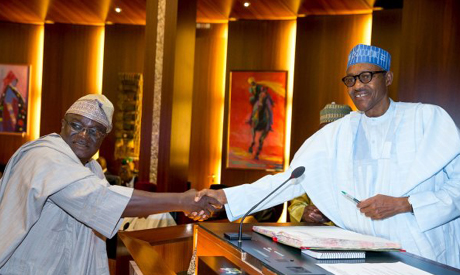
Nigerian President Muhammadu Buhari congratulates INEC National Commissioner Adedeji Shoyebi shortly after his swearing in, in Abuja, Nigeria November 9, 2015 (Photo: Reuters)
Nigeria on Wednesday finally got a new government after more than five months of waiting, as 36 ministers and junior ministers swore the oath of allegiance and were assigned formal roles.
The ceremony at President Muhammadu Buhari's official residence in the capital, Abuja, brought to an end 166 days in which he has effectively been in sole charge of Africa's leading economy.
Buhari described the appointments as a "milestone" and indicated it had taken so long to decide because of the need to put "round pegs in round holes" with the right people for the job.
"I have been conscious of the need not to repeat the mistakes of the past," he said, adding the ministers had been chosen on the basis of their abilities and performance.
As expected, Buhari, who has been seeking to streamline government and cut endemic corruption, slashed the number of ministries from 36 to 24, making some nominees only junior ministers.
He confirmed he would take charge of the oil portfolio.
The head of the state-run Nigerian National Petroleum Corporation (NNPC), Ibe Kachikwu, will be his deputy and responsible for overseeing the day-to-day running of the sector.
Kemi Adeosun, a former investment banker and accountant who recently served as finance commissioner in the southwestern state of Ogun, was appointed finance minister.
She faces a battle to get Nigeria's crude-dependent economy back on track, with government revenues hit hard since last year by the global slump in oil prices.
GDP growth is currently running at just 2.35 percent, while inflation is creeping towards 10 percent and the naira currency weak.
Buhari is keen to diversify the economy of Africa's number one oil producer, boosting investment in agriculture, manufacturing and mining.
Since taking office on May 29, he has given priority to the fight against Boko Haram, whose Islamist insurgency has left at least 17,000 dead and made more than 2.5 homeless since 2009.
The defence portfolio was handed to retired Brigadier-General Muhammad Mansur Dan-Ali, who was preferred to former army chief Abdulrahman Dambazau, who was appointed interior minister.
Intellectual property lawyer Geoffrey Onyeama was appointed foreign minister.
Former Lagos state governor Babatunde Fashola was handed power, works and housing while the former Rivers state governor Rotimi Amaechi got transport.
Fashola and Amaechi are both political heavyweights in Buhari's governing All Progressives Congress (APC) party. The latter served as Buhari's campaign manager during elections in March.
The lack of ministers since May left Nigeria in political limbo and created uncertainty in the business world.
"Political stasis has bred economic stasis, through cargoes stranded at ports, an uncertain investment climate and delayed spending decisions," Michael Famoroti, editor-in-chief of Nigeria business, economy and finance analysts Stears, told AFP.
"Too many parts of the economy have stalled as economic agents await government clarity," he said in an email.
But with the new ministerial line-up announced, it is hoped a clearer picture should emerge of the government's direction.
"The APC made a lot of promises and it needs to deliver on some of the more concrete elements," said Dawn Dimowo, of political consultancy the Africa Practice.
"So it is high time the ministers come on board; they are the ones to translate most of those promises into tangible policies and lead on their implementation."
Buhari had been running Nigeria with just permanent secretaries (senior civil servants) at government ministries, opening the former military ruler up to opposition charges of autocracy.
The new cabinet, containing just seven women, is made up of technocrats and political appointees from each of Nigeria's 36 states.
Last weekend, lawyer Aisha Alhassan, who was appointed minister for women, won a challenge at an election tribunal to her defeat at governorship polls in April.
She has indicated she will take up the post in eastern Taraba state, becoming Nigeria's first female state governor in the country's 55-year independent history.
Short link: